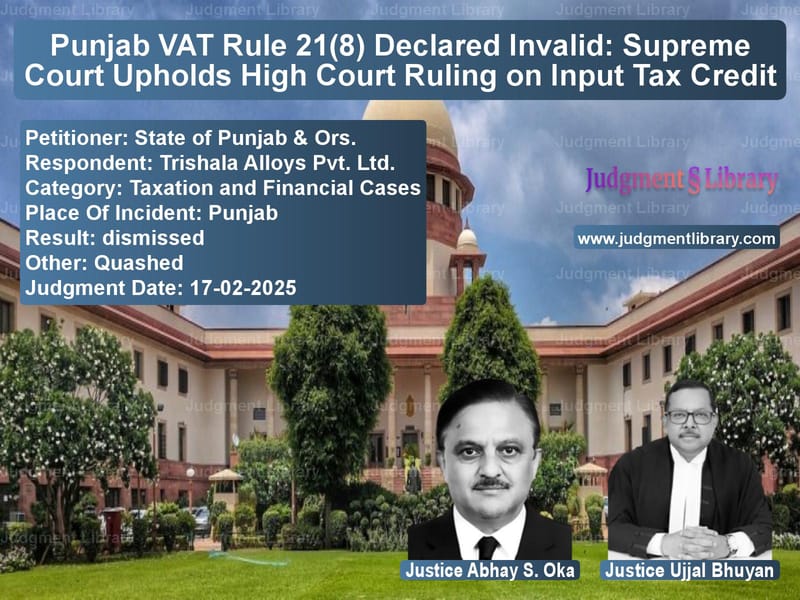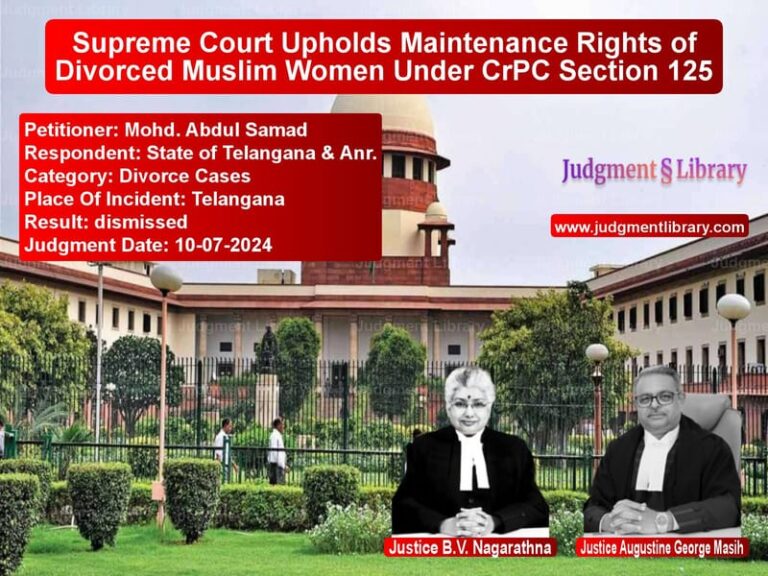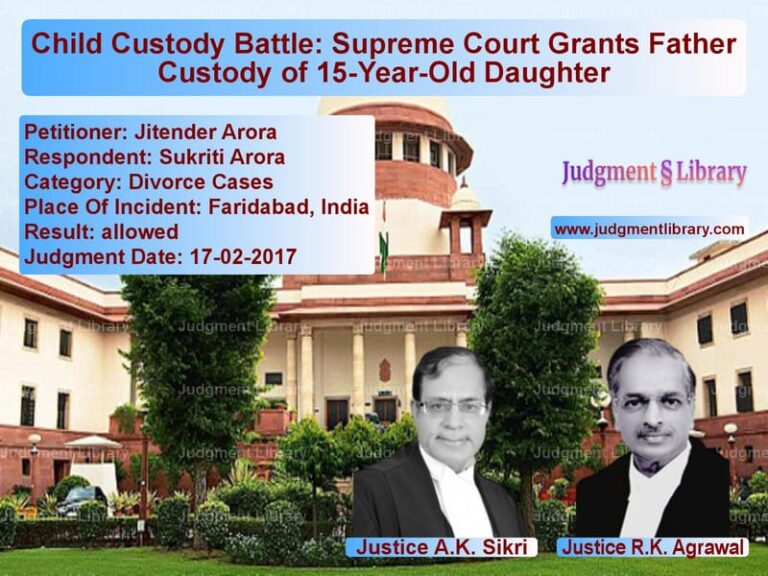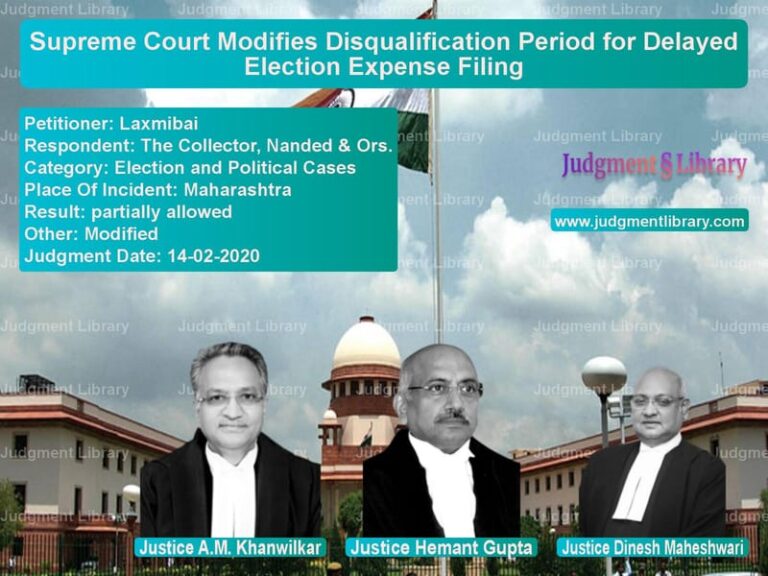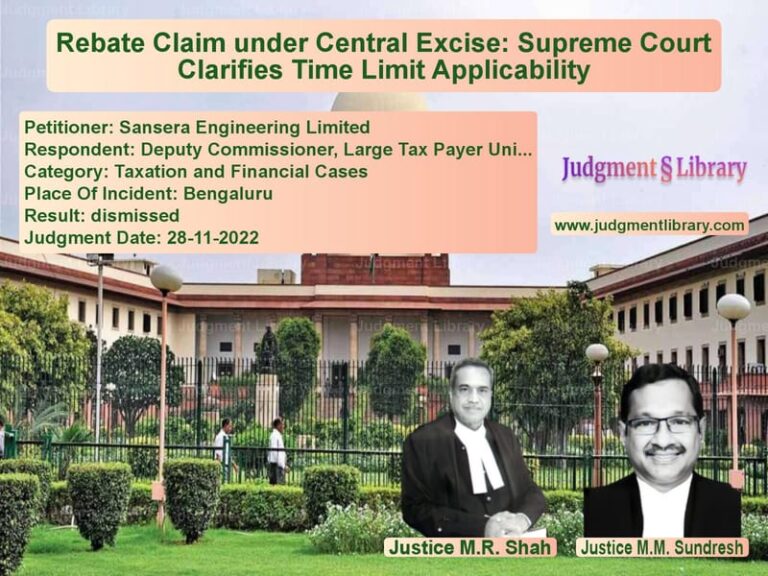Punjab VAT Rule 21(8) Declared Invalid: Supreme Court Upholds High Court Ruling on Input Tax Credit
The Supreme Court of India recently delivered a significant judgment in the case of State of Punjab & Ors. vs. Trishala Alloys Pvt. Ltd., wherein it upheld the Punjab and Haryana High Court’s decision that Rule 21(8) of the Punjab Value Added Tax (VAT) Rules, 2005, was invalid as it was introduced without statutory backing at the time. The ruling has significant implications for taxpayers and businesses operating under the Punjab VAT Act, particularly concerning input tax credit (ITC).
Background of the Case
The issue before the Supreme Court arose from amendments made to the Punjab VAT Rules on 25.01.2014, which introduced Rule 21(8). This provision stipulated that if the rate of tax on certain goods was reduced, ITC on goods lying in stock would be restricted to the new, lower tax rate. The respondent, Trishala Alloys Pvt. Ltd., and other affected parties challenged this rule, arguing that it lacked statutory support at the time of its introduction and unfairly reduced their accrued ITC.
The High Court had ruled in favor of the taxpayers, holding that the amendment lacked legal basis when introduced and could not apply retroactively. The State of Punjab appealed against this decision to the Supreme Court.
Arguments by the Petitioner (State of Punjab)
The State of Punjab presented the following arguments:
- The introduction of Rule 21(8) was a necessary fiscal measure to align ITC with the prevailing tax rates.
- The rule did not have retrospective effect but was merely clarificatory in nature.
- ITC is not an absolute right but a concession provided by the legislature, subject to modification.
- The State has the legislative competence to regulate tax matters, including adjustments to ITC.
- The High Court erred in concluding that Rule 21(8) was unconstitutional.
Petitioner’s counsel argued:
“The State government introduced the ITC scheme under Section 13 of the Punjab VAT Act to minimize the effect of VAT and to reduce the burden of tax on the ultimate consumer. Therefore, the amendments were within the legislative competence of the State.”
Arguments by the Respondent (Trishala Alloys Pvt. Ltd.)
The respondents countered with the following points:
- At the time of introducing Rule 21(8) (i.e., 25.01.2014), there was no statutory provision allowing the State to limit ITC on already purchased goods.
- The amendment to Section 13(1) of the Punjab VAT Act, which provided legal backing for such restrictions, came into effect only on 01.04.2014.
- Applying Rule 21(8) before this statutory amendment was illegal and unfair to taxpayers.
- The taxpayers had already accrued ITC at the higher tax rate at the time of purchase and could not be forced to accept a lower rate later.
Respondent’s counsel argued:
“A vested right cannot be taken away retrospectively unless there is clear legislative intent. Rule 21(8), introduced before the statutory amendment, lacked the necessary legal foundation.”
Supreme Court’s Judgment
The Supreme Court, comprising Justices Abhay S. Oka and Ujjal Bhuyan, examined the legislative framework and the sequence of amendments made to the Punjab VAT Act and Rules.
Key observations made by the Court included:
- “A taxable person who had stock in trade as on 25.01.2014 had already paid the tax while making the purchase of such goods. The State government could not reduce the ITC for such goods without statutory backing.”
- “There was no statutory provision in place on 25.01.2014 that allowed the State to notify Rule 21(8). The necessary amendment to the Punjab VAT Act only came into force on 01.04.2014.”
- “The High Court correctly ruled that the amendment to Section 13(1) of the Punjab VAT Act was prospective and could not validate Rule 21(8) for the period before its enactment.”
- “ITC is a statutory right that cannot be arbitrarily reduced through rule-making power alone. A corresponding amendment to the parent Act was necessary before enforcing such a rule.”
Legal Precedents Cited
The Supreme Court referenced several key judgments in support of its ruling:
- Eicher Motors Ltd. vs. Union of India (1999) 2 SCC 361: This case established that accrued ITC is a vested right that cannot be taken away retrospectively without statutory support.
- Sedco Forex International Drill Inc. vs. CIT, Dehradun (2005) 12 SCC 717: This ruling reaffirmed that tax laws are applied prospectively unless explicitly stated otherwise.
- Jayam & Company vs. Assistant Commissioner (2016) 15 SCC 125: This case held that a statutory amendment affecting tax credits cannot be applied retrospectively unless expressly provided for.
Final Decision
Based on its analysis, the Supreme Court upheld the High Court’s ruling and held:
- The introduction of Rule 21(8) on 25.01.2014 was invalid as there was no enabling provision in the Punjab VAT Act at that time.
- The rule could only have taken effect after 01.04.2014, when the necessary statutory amendment was made.
- Taxpayers who had already accrued ITC at the higher tax rate before the statutory amendment could not be forced to accept a reduced ITC rate.
- Rule 21(8) was therefore quashed, and taxpayers were entitled to claim ITC at the rate applicable at the time of purchase.
Conclusion
This judgment serves as a crucial precedent for taxpayers and businesses, reinforcing the principle that legislative amendments affecting tax rights must be applied prospectively unless expressly stated otherwise. The ruling ensures that ITC, once accrued, remains protected and cannot be altered arbitrarily through rule-making power alone. The Supreme Court’s decision upholds the integrity of tax laws and ensures fair treatment for taxpayers.
Read also: https://judgmentlibrary.com/taxation-on-lottery-distributors-supreme-court-ruling-explained/
Petitioner Name: State of Punjab & Ors..Respondent Name: Trishala Alloys Pvt. Ltd..Judgment By: Justice Abhay S. Oka, Justice Ujjal Bhuyan.Place Of Incident: Punjab.Judgment Date: 17-02-2025.
Don’t miss out on the full details! Download the complete judgment in PDF format below and gain valuable insights instantly!
Download Judgment: state-of-punjab-&-or-vs-trishala-alloys-pvt.-supreme-court-of-india-judgment-dated-17-02-2025.pdf
Directly Download Judgment: Directly download this Judgment
See all petitions in GST Law
See all petitions in Tax Refund Disputes
See all petitions in Income Tax Disputes
See all petitions in Judgment by Abhay S. Oka
See all petitions in Judgment by Ujjal Bhuyan
See all petitions in dismissed
See all petitions in Quashed
See all petitions in supreme court of India judgments February 2025
See all petitions in 2025 judgments
See all posts in Taxation and Financial Cases Category
See all allowed petitions in Taxation and Financial Cases Category
See all Dismissed petitions in Taxation and Financial Cases Category
See all partially allowed petitions in Taxation and Financial Cases Category

